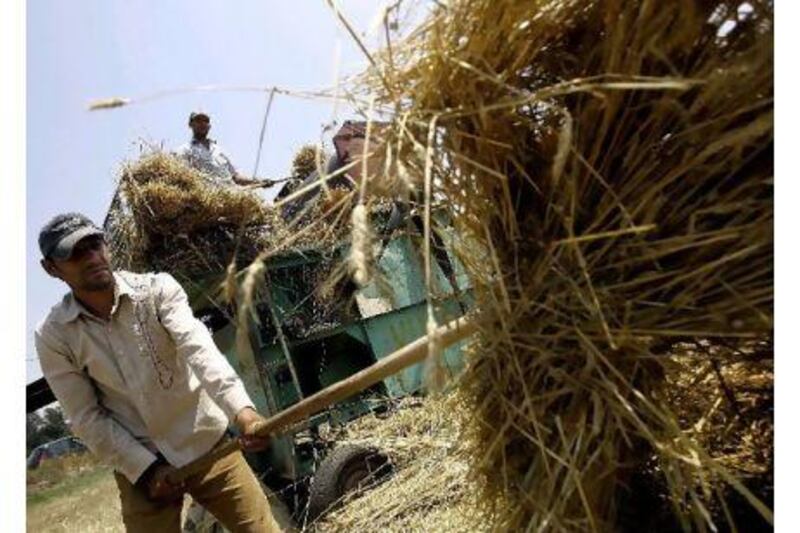TUNIS // In the days after Tunisia's January revolution, with food lorries paralysed by mounting insecurity, Mourad Ouenniche ran out of flour.
"We tried to explain the situation to customers," said Mr Ouenniche, whose bakery in a working-class district was mobbed by hungry neighbours. "But they just cried that their children needed bread."
Today Mr Ouenniche is back in business. But his scare in January mirrors a deeper problem facing Arab countries that depend on wheat imports to feed growing populations.
For decades they have used export revenues from other products to import grain and cover food subsidies. But analysts say that the model will not be sustainable and has been a cause of the recent violence across the Arab world.
"It may make economic sense, but the trade-based approach also carries risks," said Jane Harrigan, an economics professor at the School of Oriental and African Studies in London. "No matter how many exports you have, you could still be subject to supply-side shocks."
The price of wheat has nearly doubled since last year following a summer drought in Russia, a major exporter. Last month, it jumped 17 per cent in one week because of a dry spell in Europe and wet weather in the US, where rain might have interfered with planting.
Those higher prices squeeze budgets in many Arab countries.
In Tunisia, "wheat imports weigh heavily on the budget", said Assia Boussen, the director of procurement at the country's state grain importer.
Last year, Tunisia forked out Dh1.1 billion for nearly 1.5m tonnes of wheat, and there have been no plans to reduce wheat imports this year, Mrs Boussen said.
The Middle East and North Africa were the breadbaskets of the ancient world. Wheat was first cultivated thousands of years ago in the Fertile Crescent; later, Tunisia was called the "granary of Rome".
Today, however, the region's population has outstripped its capacity to produce food. Arab nations are the world's largest net grain importers, said the World Bank in a report in 2009, and their reliance on food imports has been projected to rise by 64 per cent in the next 20 years.
The imports accelerated in the 1970s, when a hike in oil prices caused incomes to rise in some Arab countries amid rapid population growth.
Tunisia has subsidised wheat since gaining independence from France in 1956. Today Tunisians lead the world in per capita wheat consumption, with 216.82kg per person a year, according to the Food and Agriculture Organisation of the United Nations.
Mr Ouenniche grew up making baguettes with his father in Bab Souika, a ramshackle quarter of Tunis centred on a square where a gate of the medieval city once stood. He opened his own bakery in 1982.
Every day, wholesalers' vans unload 1,700 kilos of flour in waist-high sacks. The flour goes into a pair of vast mixing bowls with salt, water, yeast and enzymes. It is spun into dough by electric mixers.
Workers roll the dough into baguettes, let them rise, then slide them into a gas oven with long wooden paddles.
"I feel secure as a baker," said Mr Ouenniche, who sells hundreds of baguettes daily, warm from the oven and wrapped in paper. At a fixed price of 0.2 Tunisian dinars per baguette, "even people who have no work can afford bread".
Analysts, however, have said that larger problems loom as Mena countries' finances will be squeezed by rising wheat prices, growing populations and dwindling water supplies.
When global financial turmoil in 2007 and 2008 sent food prices skyward, the poor got poorer and violence broke out over the socio-economic malaise in several Arab countries.
In Arab societies, many people spend a large percentage of their income on food, Professor Harrigan said, so that "increase in food prices has a direct impact on living standards, including among the middle classes and in gulf countries".
In late 2010 and early 2011, discontent over food prices and unemployment coupled with political grievances to produce the waves of protest and revolt in Arab countries, Prof Harrigan said.
In response, some beleaguered governments have ramped up subsidies "despite broad evidence that subsidies strain public finances, distort markets and provide only a blunt tool in the fight against poverty", said Clemens Breisinger, a development analyst at the International Food Policy Research Institute (IFPRI), a think tank in Washington.
In some cases, such measures have also failed to appease those bent on revolution. Tunisia's former president, Zine El Abidine Ben Ali, cut baguette prices by 5 per cent days before he was toppled in January.
Algeria hurriedly reversed food price hikes that sparked riots in January, but has since resorted to massive police deployments to smother continuing protests.
In recent years Jordan, Bahrain and the UAE have bought land in sub-Saharan countries for agriculture, Professor Harrigan said. But financial belt-tightening will also be needed.
"Subsidies should target the poor, or be replaced by food-for-work programmes and direct cash transfers," she said. "Financial strain will become a big issue in the next few years."





